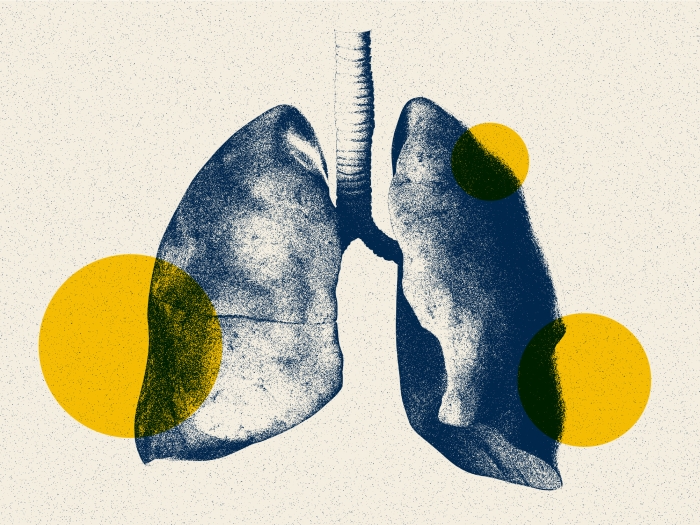A new study finds smokers who haven’t been diagnosed with COPD may still experience COPD-like symptoms. This begs the question: Should the diagnostic requirements for COPD change?
12:28 AM
Author |

We know smoking can cause respiratory issues.
Case in point: A new study in the New England Journal of Medicine finds that smokers, who wouldn't typically be diagnosed with chronic obstructive pulmonary disease, or COPD, are still showing symptoms consistent with the diagnosis.
According to the Centers for Disease Control and Prevention, COPD is the third-leading cause of death in the United States with tobacco smoke being a key factor in its cause.
COPD causes breathing-related problems and blockage of airflow in the body. Symptoms of the disease include shortness of breath, coughing, difficulty exercising and history of asthma. It's diagnosed using spirometry, a breathing test that checks how well your lungs can inhale and exhale.
Researchers looked at spirometry data and respiratory symptoms of more than 2,700 patients, including current or former smokers, as well as individuals who never smoked. They found that about half of current or former smokers experienced respiratory symptoms similar to COPD, as well as an increased risk for flare-ups in their symptoms, even though their lungs seemed to function normally according to the spirometry test results.
Meilan Han, M.D., one of the lead authors of the study, an associate professor of internal medicine at the University of Michigan, and the medical director of the U-M Women's Respiratory Health Program, explains more about the results.
What is the most important takeaway from the study?
Han: We found that a significant number of current and former smokers who don't meet the typical criteria for COPD (based on a breathing test)otherwise look and behave like patients who do carry a diagnosis of COPD.
Can you expand on that finding?
Han: Specifically, we found significant respiratory symptoms in half of the current or former smokers with technically "normal" breathing tests. We also found that these individuals needed to seek medical attention for breathing flare-ups with similar frequency as some patients who actually meet criteria for a diagnosis of COPD.
How do you think this study will benefit this patient group in the future?
Han: My hope is that it will generate more research on this group of patients, as clinically they have evidence of disease, but we have no name for the condition. At the University of Michigan, we will actually be leading a National Institutes of Health-sponsored trial to study use of a bronchodilator medication in this patient population to understand if this type of medication actually helps improve symptoms. This will be the first step towards providing some guidance for physicians on how to treat these patients.
Do you think this study points out that the definition of COPD should be adjusted?
Han: That's a great question. I think we do need a name for this condition so we can define these patients and develop treatments. However, it's still unclear whether these patients have "early" COPD, in that they will ultimately progress to airflow obstruction that we can detect on a breathing test. More information is still needed.
Why did you want to study this topic/specific patient base?
Han: Clinically, this is an important group of patients that we as physicians currently have no guidance on how to treat. A significant percentage of these symptomatic smokers with "normal" breathing tests had been given respiratory medications by their doctors to treat their symptoms, but this is a group of individuals that has never really been studied with those medications in clinical trials. Therefore physicians really have no evidence base to guide decision making.
Why should the general public care about this topic?
Han: Given how common smoking is, everyone likely knows someone who suffers the condition we describe here. As these patients may require medical treatment and in some cases even hospitalization, the impact of this condition is very real. This study is just the first step in trying to better identify these patients so we can develop targeted treatments.

Explore a variety of health care news & stories by visiting the Health Lab home page for more articles.

Department of Communication at Michigan Medicine
Want top health & research news weekly? Sign up for Health Lab’s newsletters today!





